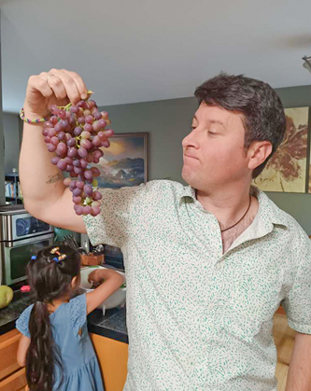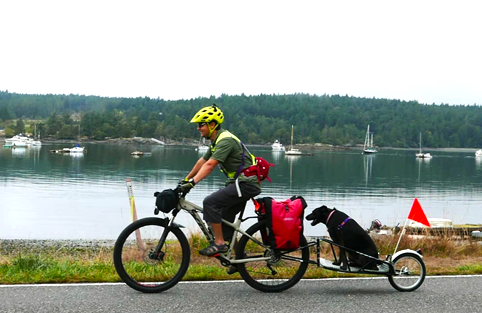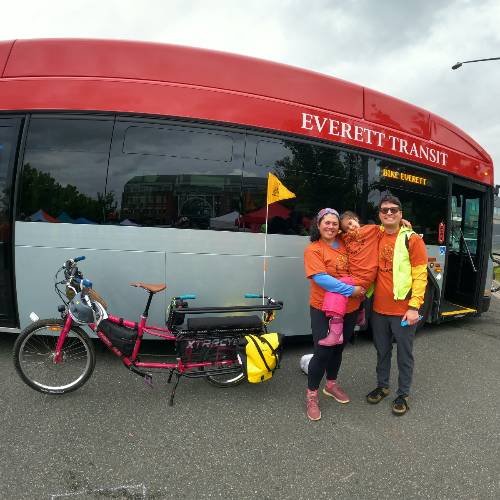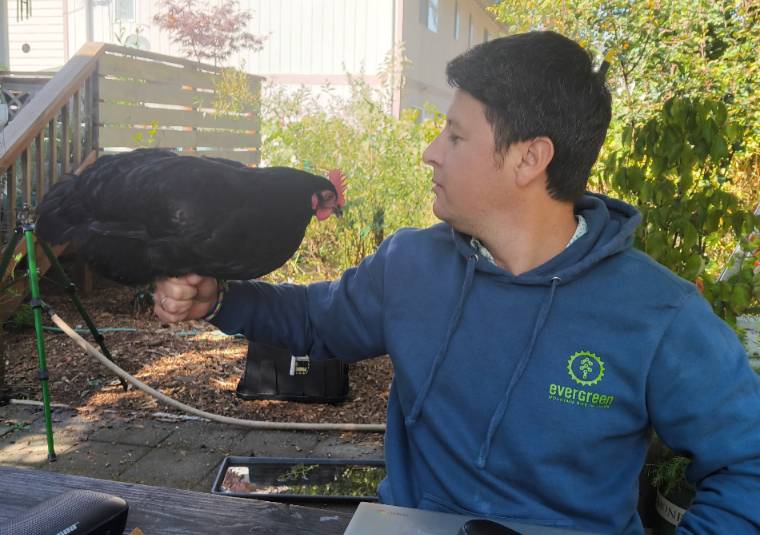Luis Burbano
Cascadia Alumni Profile - Published October 1, 2025

Luis Burbano
Cyclist brings sustainability lessons to civic leadership and to his own backyard—literally
Cascadia’s Assistant Director of Sustainable Practices, Stephan Classen, recently caught up with alumni Luis Burbano. Even with a calendar chock full of a day job, family, community service, bicycling, and a backyard project—not to mention actively campaigning for Everett City Council—Luis graciously squeezed out some time to chat with Stephan.
(Please note that this is not an endorsement for Luis’s candidacy. As a public agency Cascadia College never endorses candidates for elected office. Luis is running against Alan Rubio in the November 2025 election.)
Luis Burbano graduated in 2021 from Cascadia College with a Bachelor of Applied Science in Sustainable Practices (BASSP). He came to Cascadia wanting to integrate sustainability into his career and an intentional lifestyle.
Stephan Classen: What do you do on a day-to-day basis in your position?
Luis Burbano: I am the equipment manager for a communications system in aircraft at Boeing, and
it’s fun because I get to solve problems almost every day!
SC: What are you doing now that you’ve graduated from the Sustainable Practices bachelor’s
program?
LB: I continue to work in my job as an engineer at Boeing. I ride my bike to work, I
am building a food forest in my backyard, and I have the opportunity to run for city
council in Everett. I ride my bicycle to work to reduce traffic, emissions, and pollution
and I have been a big advocate of bicycle infrastructure, safer roads, and multimodal
transportation in Everett, especially in my work with the Sound Transit Community
Board for the design of the light rail in Everett.


In our backyard food forest my family and I have multiple ground cover plants, berry bushes, and fruit trees that are aimed to work as a sustainable system, in which each element of the garden takes care of another element of the garden. For instance, the ground covers protect the roots of the other plants during the summer, and the bigger plants provide shade and nutrients to the ground covers. Recently, we added chickens that help by fertilizing the garden and keeping weeds and bugs in line. Chickens also dig holes, which help to aerate the soil. The food scraps from our kitchen are given to the chickens, which then in return fertilize the garden and provide eggs for us to eat. We also have a small worm farm that provides fertilized soil, composts food scraps, and helps feeding the chickens.
Pretty much we hope that in a few years the garden will take care of itself, and it will partially feed my family and the chickens.

With my wife, we also own a small business, Tamia Cakes. Tamia Cakes specializes in custom cakes, cupcakes and my favorite, cake in a jar.
SC: What was your best experience or memory in the BASSP program?
LB: I really enjoyed going to the local park to estimate the different types of trees
and vegetation in the area. For another assignment, I rode my bicycle to a mountain
and went up the fire road and every 500 feet of elevation gain, I gathered data on
the distribution of vegetation. I had lots of fun doing it!
SC: Did your experience at Cascadia help you get to where you are now?
LB: Yes! At Cascadia we learned that a sustainable society must be able to maintain
its resources locally. We also learned that a safe community must have green spaces
such as parks and community gardens. Community gardens are a great way to have neighbors
meet each other, and they also teach people about nature, gardening, and how to eat
healthy. Community gardens also provide people with activities to reduce stress and
this alleviates mental health issues.
SC: Are you using any skills you learned at Cascadia in your current work?
LB: I used skills I learned at Cascadia College for the food forest at my house; concepts
such as permaculture and soil regeneration are ones we have applied. For my city council
campaign, I have used concepts such as gentrification, social justice, sustainable
transportation, resource optimization, rain gardens, sustainable street design. In
the program, we were also required to take a government class and that provided a
lot of political background for my campaign and things I hope to help change.
SC: Did you feel the internship and capstone projects were worthwhile for your career
and progress?
LB: Yes, I was an intern with Everett Bike and Walk and learned a lot about sustainable
transportation. In addition, for the capstone project, I wrote a book that covers topics such as food availability, transportation, gardening, sustainable
food, and social justice. You can still find it online through the Kodiak Cave – Cascadia’s
food resource center!
SC: Thank you, Luis, for spending time with us and sharing your story!
Cascadia College offers an associate degree and certificate in Water Resource Management and a brand-new Sustainability Concentration that any associate-level student can pursue to integrate sustainability principles into your education and expand your career opportunities. For more information contact sustainability@cascadia.edu.